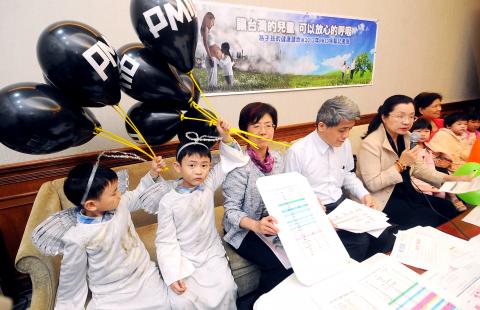Changhua Christian Hospital gynecologist and Taiwan Healthy Air Action Alliance founder Yeh Guang-peng (葉光芃) yesterday said that Taiwan’s regulations on controlling PM10 — fine particles in the air of up to 10 micrometers — are too loose and will cause the most harm to pregnant women, infants and children.
At a press conference held at the Legislative Yuan by Democratic Progressive Party Legislator Tien Chiu-chin (田秋堇), attended by several doctors, a few legislators and Environmental Protection Administration (EPA) officials, Tien said while the Department of Health has set an annual average “tolerable level of PM10” of 65 micrograms per cubic meter and a 24-hour average of 125 micrograms per cubic meter, the WHO guideline recommends stricter levels, set at 20 micrograms per cubic meter for the annual average and 50 micrograms per cubic meter for the 24-hour average.
Showing research results from the US and Switzerland about the effects of air pollution on pregnant women and children, Yeh said air pollution during pregnancy affects lung function in newborns and reduces growth of the lungs during childhood, adding that “once damage is done to the lungs, it is irreversible.”

Photo: Wang Min-wei, Taipei Times
“Air pollution also accelerates lung-function loss and causes lungs to age faster in adults who are often exposed to air pollution” he added.
Yeh said the doctors and civic groups have received three lists from the WHO showing the rankings of several countries according to their PM10 annual average in 2008, 2009, and between 2010 and last year. These statistics clearly showed that Taiwan’s PM10 air pollution was much worse than in several neighbouring countries and areas, such as Japan and Singapore, and about twice the PM10 level in Switzerland.
They urged the EPA to amend and enforce stricter regulations on PM10 to protect Taiwanese, especially pregnant women and children, against lung disease and allow them to feel safe breathing outside every day.
Air Quality Protection and Noise Control Bureau Director-General Hsieh Yen-rui (謝燕儒) said the air quality in Taiwan has actually improved through the years, dropping from a PM10 annual mean of 62.8 micrograms per cubic meter in 2005 to 50.2 micrograms per cubic meter last year, but the administration would continue to reflect on its regulations and strive to improve air quality.

The manufacture of the remaining 28 M1A2T Abrams tanks Taiwan purchased from the US has recently been completed, and they are expected to be delivered within the next one to two months, a source said yesterday. The Ministry of National Defense is arranging cargo ships to transport the tanks to Taiwan as soon as possible, said the source, who is familiar with the matter. The estimated arrival time ranges from late this month to early next month, the source said. The 28 Abrams tanks make up the third and final batch of a total of 108 tanks, valued at about NT$40.5 billion

Two Taiwanese prosecutors were questioned by Chinese security personnel at their hotel during a trip to China’s Henan Province this month, the Mainland Affairs Council (MAC) said yesterday. The officers had personal information on the prosecutors, including “when they were assigned to their posts, their work locations and job titles,” MAC Deputy Minister and spokesman Liang Wen-chieh (梁文傑) said. On top of asking about their agencies and positions, the officers also questioned the prosecutors about the Cross-Strait Joint Crime-Fighting and Judicial Mutual Assistance Agreement, a pact that serves as the framework for Taiwan-China cooperation on combating crime and providing judicial assistance, Liang

A group from the Taiwanese Designers in Australia association yesterday represented Taiwan at the Midsumma Pride March in Melbourne. The march, held in the St. Kilda suburb, is the city’s largest LGBTQIA+ parade and the flagship event of the annual Midsumma Festival. It attracted more than 45,000 spectators who supported the 400 groups and 10,000 marchers that participated this year, the association said. Taiwanese Designers said they organized a team to march for Taiwan this year, joining politicians, government agencies, professionals and community organizations in showing support for LGBTQIA+ people and diverse communities. As the first country in Asia to legalize same-sex

MOTIVES QUESTIONED The PLA considers Xi’s policies toward Taiwan to be driven by personal considerations rather than military assessment, the Epoch Times reports Chinese President Xi Jinping’s (習近平) latest purge of the Chinese People’s Liberation Army (PLA) leadership might have been prompted by the military’s opposition to plans of invading Taiwan, the Epoch Times said. The Chinese military opposes waging war against Taiwan by a large consensus, putting it at odds with Xi’s vision, the Falun Gong-affiliated daily said in a report on Thursday, citing anonymous sources with insight into the PLA’s inner workings. The opposition is not the opinion of a few generals, but a widely shared view among the PLA cadre, the Epoch Times cited them as saying. “Chinese forces know full well that